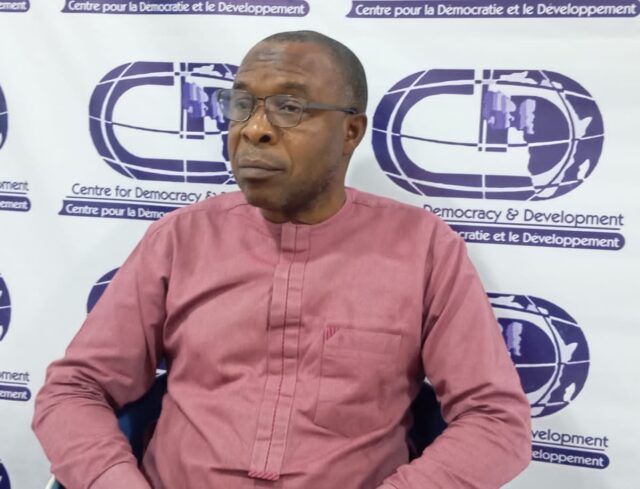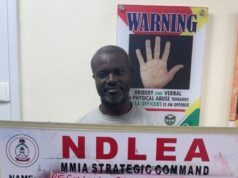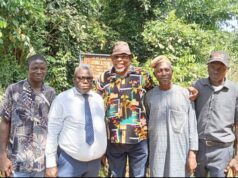…Wants actions on Africa’s post-colonialism retardation
By Editor
The Centre for Democracy and Development (CDD-West Africa) has said that it is holding a two-day Frantz Fanon Centennial Conference, from 27 to 28 November 2025 at the University of Jos, Plateau State.
The CDD-West Africa Director, Dr. Dauda Garuba, said this on Monday in Abuja.
He said the Fanon Centennial Conference, is hosted by the CDD-West Africa and the Council for the Development of Social Science Research in Africa (CODESRIA), in partnership with the Academic Staff Union of Universities (ASUU), the University of Jos and the Centre for Information Technology and Development (CITAD).
He said that the event will mark 100 years since the birth of Frantz Fanon, one of the most influential anti-colonial thinkers of the 20th century.
Holding under the theme “Fanon and the African Condition: Reflections on an Enduring Legacy,” Dr. Garuba said the gathering will convene leading scholars, researchers, policymakers, writers, activists, and students from across Africa and the Global South.
He also said that the event would also serve as a reflection of the state of what Africa has been in the last 60 years after most of the countries had gained independence from colonialism.
“And one thing we all were used to as students in the university was to experiment or if you like, organize around the ideas propounded by several radicals and Africanists, like Frantz Fanon, like Walter Rodney and several others that we all know.
“But the fact is also that over the years, when we lived under colonialism, we got to the point where we thought that at independents we needed to define our own movement. And we had countries that grew up out of colonialism with the hope of developing their countries.
“And I want to draw your attention visibly to that of Kwame Nkruma, that said that “Seek ye first the political kingdom of Africa and every other thing shall be added to it”. And as you rightly alluded, it’s over 60 years that most of African countries have had their independents, and they have still not moved outside running after these colonial masters.
“The question is, if we had not attained development that was so promising at the time of independence, it means that there was something really wrong with what had happened after independence,” Garuba said.
He said that what was wrong is being seen visibly on daily basis, that Africa cannot even organize basic things as elections.
He said, “We’ve gotten to the point where even, what we promised people towards independence or immediately after independence, like I will build school, I will build roads, I will provide water and electricity, are still what we are promising the voters in the 21st century.
“So, if you experimented with this system for 60 years or over 60 years, you are not getting any headway. You need to sit down and tell yourself that perhaps I need to re-examine myself and what I’m doing, if I’m doing it right.
“And it is in that context that people have contested the whole idea of the kind of democracy that we practice. Are we pursuing the right kind of democracy? Because if we are doing that, we ought to be getting the right result in terms of democracy.”
Dr. Garuba said that if one followed a path for over 60 years and not getting results, it is time for one to sit back, analyse what has happened in these past 60 years for necessary actions.
He said, “So, I see the Jos Congress as an opportunity for us to sit around the table. And talk to ourselves. As to what are those things that are wrong with Africa. That we are not able to move to where we have anticipated we are going to be at independence.
“So, these are some of the things. And this is why, of course, we are bringing together, not just academics, but also those who are in the business of policy making and implementation. Including those who are in the acts, those who are in different fields. Let’s sit down together and see how we can rescue our continent from the current challenges that we face.”
Speaking further on the conference, he said that Fanon’s searing analyses of colonialism, race, mental health, class, and alienation continue to shape contemporary struggles for justice and liberation.
Dr. Garuba noted that Fanon’s works resonate deeply with the continent’s current challenges, democratic reversals, governance failures, youth-led protests, and shifting global power dynamics.
“The two-day hybrid conference will feature a keynote address by Professor L. Adele Jinadu, alongside over 70 academic papers across ten thematic streams, featuring roundtables on labour, gender, and decolonial thought, and intergenerational dialogues that bridge senior scholars and emerging voices.
“In addition to engaging Fanon’s contributions to philosophy, psychiatry, and Pan-Africanism, the conference will reflect on his relevance to contemporary politics, culture, resistance, innovation and the place of Africa in the global order.
“The choice of Jos as the host city is symbolic. Jos is a city long associated with activism, civic resistance, and class struggle. Partnering with the University of Jos aligns with CDD-West Africa’s commitment to decentralising knowledge production and strengthening critical scholarship beyond neoliberal power centres.
“Importantly, the Fanon Centennial Conference will unfold during the global 16 Days of Activism against Sexual and Gender-Based Violence (SGBV). While not framed as part of that SGBV campaign, the conference offers a timely opportunity to explore how Fanon’s ideas help us interrogate the structures that enable colonial violence, patriarchy, and economic subjugation,” Garuba said.
Discover more from TheTimes Nigeria
Subscribe to get the latest posts sent to your email.









